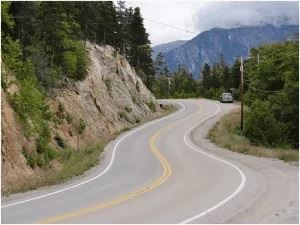Millions of people travel along U.S. roadways every day. Whether it’s a commute to work or a trip to the grocery store, driving is heavily embedded in our culture. The necessity of travel has paved the way for innovation in safety and global conservation. Seatbelts are required by law in most states and groundbreaking moves have been made in the world of self-driving electric cars. Although these advances in technology have made roadways much safer for the general public, some roads still pose a greater danger. That’s why we’ve put together a list of the most dangerous roads in the USA.
There are still approximately 1.25 million people across the world that die in car crashes every year. Some of the major contributing factors to roadway-related crashes are dangerous weather conditions, drunk driving, and ignoring traffic laws. Although you should always stay alert behind the wheel, here’s a list of just a few of the roads you should be extra cautious on while traveling in the USA.
New Mexico’s I-40
The desert is an unforgiving terrain. Whether it is the sizzling heat or terrifying dust storms, there is always something to be on the lookout for in the desert. Interstate 40 in New Mexico is home to over 344 crashes and 395 fatalities in the last decade, making it one of the many treacherous pathways of the arid lands.
This dangerous roadway stretches approximately 373 miles from Texas to Arizona. Before its completion in 1970, one particular stretch of I-40 was known across the nation as “Slaughter Lane.” This nickname came to be as an illustration to the numerous fatal crashes caused by an absurd amount of traffic for a two-lane highway combined with uneven paving.
Today, the most perilous section of this road is where I-40 intersects with I-25 near downtown Albuquerque. The congested intersection causes many fatal car crashes every year. It is extremely wise to stay alert when traveling along the I-40. The desert is a chilling place to be stranded.
For a free legal consultation, call (212) 732-2929
Wyoming’s I-80
With 175 crashes with 207 fatalities in the past ten years, Interstate 80 in Wyoming is a force to be reckoned with. This massive stretch of highway takes up about 402 miles from the Utah state line all the way to Nebraska. While the Wyoming stretch of I-80 passes through natural beauties such as Bear River State Park and the state’s famous ice caves, it is also ranked as the eighth most dangerous road in the U.S.
Poor weather conditions are a major contributing factor, but distracted driving and even drunk driving are also common causes of accidents on this dangerous roadway. No matter the weather, it is definitely vital to keep your senses about you when traveling on this winding road.
Arizona’s I-40
The Arizona stretch of Interstate 40 has also earned itself a seat at the dinner table for dangerous roads in America. This massive roadway has housed 249 crashes resulting in 293 fatalities in the past ten years. Unlike many highways in the U.S., one of the biggest dangers of the I-40 in Arizona is dust storms.
Dust storms can stretch up to 62 miles with winds reaching 65 miles per hour. These storms are known to take full-size vehicles off of roadways with ease. Although it is dangerous to be caught in one of these massive storms, it is even more risky to continue to drive through the dust. If you find yourself trapped in a dust storm, it is safest to pull over and wait it out. Trying to continue the trek through the storm could very easily result in your demise or even the death of others.
Click to contact our personal injury lawyers today
Montana’s Highway 2
When most people think about a dangerous highway, they assume it has to be overpopulated and busy, but that’s not the case with this selection. Highway 2 in Montana stretches from Butte to Three Forks. It’s in a remote location and attracts motorists with reckless behaviors.
There’s no doubt that the area provides some stellar landscapes and amazing drives. However, distracted driving caused by scenery gazing can lead to a fatal outcome not only from a violent crash but by being stranded. It can take an ambulance up to 90 minutes to reach you. What may start out as a simple accident or breakdown can turn into a life threatening situation very quickly if you don’t get the help you need.
While traveling in Montana, it’s wise to keep your speed at a reasonable level and stay alert for reckless drivers. Hopefully, you can make it across the highway without any peril.
Complete a Free Case Evaluation form now
California’s I-40
Driving in California is a nightmare. The traffic in Los Angeles is famous for being some of the worst in the world. State Road 138 and I-15 are synonymous with danger. However, another stretch of I-40 resides in Southern California and it is certainly one to be wary of. Expanding 154 miles from the Arizona state line to Barstow, this section of highway has harbored 116 crashes with 136 fatalities in the last ten years.
Although an effort has been made to alleviate the traffic and road problems, the construction zones have caused more accidents than they have prevented. If you find yourself traveling on this stretch of highway, be sure to stay aware of the roadways and those who drive on them. The scenery of the Mojave Desert may be beautiful, but letting it distract you may cost more than it’s worth.
U.S. Highway 83 in Texas
Texas boasts that everything’s bigger in its state and it’s safe to say that Highway 83 embodies precisely that. Stretching a massive 893 miles from the United States-Mexico border all the way to the Oklahoma state line, Highway 83 has accrued a staggering 268 crashes with 336 fatalities over the past decade.
Although the Texas terrain can be rough, drunk drivers are the biggest threat to look for on Route 83. Drunk drivers are the cause of over 50 percent of all crashes on this major roadway. This makes them one of the most dangerous threats in the Lone Star State. If you find yourself traveling down this treacherous road be sure to keep a close eye on the other drivers and report any suspicious behavior to the proper authorities.
Houston’s I-45
Because of how big Texas is, it only makes sense that there would be another stretch to watch for. I-45 averages more than 56 traffic fatalities for every 100 miles. This major highway in Houston tends to be regularly congested, making travel even more complicated.
You won’t encounter an abundance of poor weather in this area unless it’s hurricane season. Most accidents are the result of drunk driving, distracted driving, operator errors and speeding instead. Pay attention to changing traffic patterns and frustrated commuters if you find yourself on this stretch.
Alaska’s James Dalton Highway
It’s not uncommon for a rental car company to forbid users from taking a vehicle to this region, but it should be a warning sign of how dangerous the terrain actually is. The James Dalton Highway, located in Alaska, comes with numerous hazardous elements to it.
First, there are the giant potholes you have to maneuver around. Add to that subzero temperatures and racing winds for a recipe of disaster. Thankfully, you aren’t going to find yourself on this road by chance. You would have to plan to be there, which many people do. Resisting the natural beauty encompassing the highway is hard. If you simply can’t stay away, be prepared for a broken windshield and some worn out tires when you are finished. Hopefully, you can avoid an accident in the process.
Florida’s U.S. Highway 1
Last but certainly not least is the Florida section of Route 1. This nightmare roadway has culminated a whopping 1011 crashes and 1079 fatalities over the past ten years. It is ranked as the most dangerous road in the U.S. The Florida stretch of Route 1 expands approximately 545 miles along the East Coast and is a popular roadway used by tourists from around the world to travel across the tropical state.
While the confusion of tourists traveling in a new place may play a major role in why this road is so dangerous, other contributing factors are likely to be aggressive driving and highway congestion. Nothing compares to the beauty of the tropical terrain that covers Florida but make sure not to get too enamored by your surroundings if you find yourself traveling here. It may cost you more than your vacation to the Sunshine State.
Stay Safe – Arrive Home
If you want to make it back to your loved ones, it’s wise to exercise extreme caution anytime you travel at high speeds. Here are a few other safety tips that will help you avoid deadly collisions.
- Watch your speeds. Remember to adjust them as needed for inclement weather or shifting traffic patterns.
- Maintain a safe following distance. Allow yourself at least three seconds of reaction time between you and the vehicle in front of you.
- Be aware of tractor trailers and don’t cut them off. Signal early and make your intentions known.
- Stay in the right lane unless you are passing.
- Turn on your headlights in bad weather.
- Remain alert.
- Don’t drink and drive.
Featured Image Credit: babylass / Pixabay
In Post Image Credit: Ken Lund / flickr
Our attorneys bring extensive experience to a range of personal injury cases, including car and construction accidents, catastrophic injuries, wrongful death, and more.
Call or text (212) 732-2929 or complete a Free Case Evaluation form






